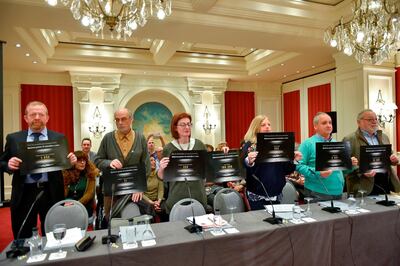Basque militant group ETA has announced it has formally disbanded after waging a violent independence campaign in northern Spain and southern France for over four decades.
In a letter sent to Basque organisations, the ETA - whose initials translate as Basque Homeland and Freedom or Euskadi ta Askatasuna - even issued a partial apology for its actions. The letter was dated April 16 but was only made public on Wednesday.
The ETA killed more than 850 people between 1968 and 2010 before announcing a permanent ceasefire in 2011.
The militant group said the dissolution "doesn't overcome the conflict that the Basque Country maintains with Spain and with France."
"The Basque Country is now before a new opportunity to finally close the conflict and build a collective future," the ETA added. "Let's not repeat the errors, let's not allow for problems to rot."
It wasn't immediately clear why the letter was dated two weeks earlier.
A spokesman for the Basque regional government said that it received ETA's letter "a few days earlier." The official, who wasn't authorised to be named in media reports, declined to elaborate.
_______________
Read more:
What Kurdistan can learn about secession from Spain
How the Basque Country provides intriguing solutions to some of the world’s thorniest challenges
France finds tonnes of weapons disclosed by ETA group
_______________
Spain has vowed to continue investigating the ETA’s crimes. Victims group Dignidad y Justicia’s estimates there are nearly 400 deaths connected to the ETA which remain unresolved.
"For us there will be no end of Eta as long as there is not justice for all," Dignidad y Justicia’s president, Daniel Portero, told the European Parliament in 2017 when the militants announced they were disarming.
Interior minister Juan Ignacio Zoido said on Wednesday the police would “pursue the terrorists wherever they may be”.
"ETA obtained nothing through its promise to stop killing, and it will obtain nothing by announcing what they call dissolution," he said.
ETA was founded in 1958 during General Francisco Franco’s dictatorship and evolved from promoting Basque culture to paramilitary activity.
The group grabbed global headlines when it killed the dictator's anointed successor, Prime Minister Luis Carrero Blanco, in 1973. It remained active long after Franco's own death in 1975.
The group's bloodiest period came as Spain transitioned from dictatorship to democracy during the early 1980s. It targeted not only members of the military and police forces, but politicians, entrepreneurs, civilians and some of its own members who wanted to leave ETA.
In all, the group killed 853 people over four decades, according to a tally by the Spanish Interior Ministry. ETA also injured more than 2,600 people, kidnapped 86 and threatened hundreds more, according to the latest government count.
At least another 60 people were killed by death squads set up by members of Spain's security forces to perform extrajudicial killings of ETA militants, in what became known as Spain's "dirty war" on terror.

Civil society groups that have overseen ETA's staggered finale scheduled an event in Southern France on Friday to mark the organization's end. The militant group itself had hinted that a final declaration would arrive this week.
At a press conference on Wednesday in San Sebastian, minutes before the militant group's letter was published, victims group Covite criticised a statement last week in which ETA sought forgiveness from victims "who didn’t have a direct participation in the conflict."
"This is not the end of ETA we wanted and, above all, is not the end of ETA we deserved," said Covite’s president Consuelo Ordonez.
Ms Ordonez’s brother Gregorio, a leading regional figure in the conservative Popular Party, was killed by ETA in 1995.
Covite chided ETA for, among other things, failing to provide information about hundreds of unsolved crimes and failing to condemn its own history of terror and violence.
Some 300 ETA members are imprisoned in Spain, France and Portugal and up to 100 are still on the run, according to prisoners' families' group Forum Social.
The group has demanded that prisoners be moved to prisons closer to their families after the end of ETA.
International mediators are organising a peace conference in southwest France on May 4.

